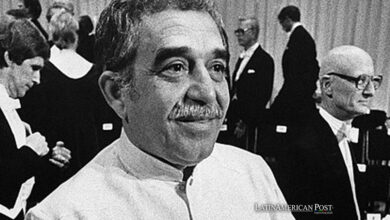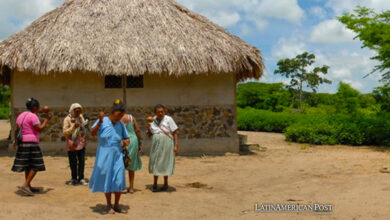UN: peace in Colombia cannot be a victim of COVID
Carlos Ruiz Massieu, head of the UN Verification Mission in Colombia, will present to the Security Council in New York on July 14 the quarterly report of the Secretary General on the Mission in the country .

United Nations report indicates the impact that the pandemic has had on the implementation of the peace agreements in Colombia. / Photo: UN
LatinAmerican Post | Javier Delgado Rivera
Listen to this article
Leer en español: ONU: La paz en Colombia no puede ser víctima del COVID
Carlos Ruiz Massieu, head of the UN Verification Mission in Colombia, will present the quarterly report to the Security Council in New York on July 14 of the Secretary General on the Mission in the country. In his report António Guterres, top international diplomat, points out both the impact that the pandemic is having on the implementation of the Peace Agreement, and ways to tackle this setback.
According to Guterres, “the pandemic has demonstrated the vulnerability of communities in areas where the state presence remains weak. It is essential to provide these conflict-affected communities with opportunities, infrastructure, services, and investment to bring them security and development through a comprehensive deployment of state institutions. ”
"La pandemia dificulta aún más el ya por sí difícil proceso de construcción de paz en Colombia con respecto a diferentes temas como seguridad, proceso de reincorporación económica de excombatientes, pero también se está tomado como pretexto para modificar el acuerdo o desfinanciarlo por algunos actores políticas“ – Prof. Dr. Stefan Peters, Director del Instituto Colombo-Alemán para la Paz – CAPAZ
Megan Janetsky, journalist of the New York Times and the BBC based in Colombia agrees. "Quarantine and this new medical crisis have aggravated political unrest and the implementation of the peace process, worsening existing problems," Janetsky tells us by email.
From New York, Guterres calls on the Colombian authorities to redouble their efforts to work with the FARC in the allocation of land to ex-combatants, both for housing and for productive projects, "which continues to be a fundamental requirement for the sustainability of their reinstatement. ”
Also read: How is Latin America doing with the Sustainable Development Goals?
The report, issued every three months to update the UN Security Council, highlights that the COVID-19 technical table created by the Government and the FARC has already started a total of 57 collective projects and more than 1,300 individual ones. Programs that, so far, have benefited around 30% of accredited ex-combatants. Still, the UN chief encourages Colombian authorities to pay more attention to two groups in particular: children and ex-combatants from ethnic communities.
COVID-19 as an alibi for violence
In a recorded message , Carlos Ruiz Massieu, who is also the Special Representative of the Secretary General in Colombia, admits that the quarantine situation has been exploited by armed groups and criminal organizations to extend control in the territories where they are, as are the cases of the departments of Cauca, Meta, Putumayo, Nariño, Antioquia and Chocó.
#Declaración Jefe @MisionONUCol, @CGRuizMassieu , hace extensivo el llamado del Consejo de Seguridad a todas las partes en conflictos armados para que cesen hostilidades y hagan pausa humanitaria para atender #COVID19 y proteger resultados de paz. https://t.co/wzEjE7tyNP pic.twitter.com/g1oJl1UKSu
— Misión de la ONU en Colombia (@MisionONUCol) July 2, 2020
In his report, the UN Secretary-General highlights the continued killings of social leaders, human rights defenders and ex-combatants, "many while awaiting a response to their requests for protection."
"Aliento a todos los actores relevantes a que redoblen sus esfuerzos en la lucha contra la impunidad, entre otras cosas mediante la captura de las personas” en búsqueda y captura — António Guterres.
Journalist Janetsky has been able to observe this phenomenon first hand. "Social leaders, who in some cases are being attacked and killed by armed groups, have told me that areas neglected by the state are being ignored. Those most affected by these decades of conflict say they fear for the future of peace in Colombia," he says.
New crisis, same – and exacerbated – inequalities
"The current levels of inequality in Colombia (in work, income, housing, education, food, security, care, health …) are unsustainable to build a stable and lasting peace that has an economy that thrives, social cohesion and better democracy, ” Prof. Dr. Peters tells us in an email conversation with the LatinAmerican Post.
An aspect of the utmost importance when analyzing the peace process in the country. “The Colombian peace agreement is based on the idea of structural change; the elimination of many of the factors that generate violence and crime. The pandemic, and the economic crisis that it entails, are more likely to entrench such structural inequalities, ” Elizabeth Dickinson, analyst at Crisis Group for Colombia , tells us by email.
Estas disparidades se acentuarán con más fuerza en las zonas rurales. ”Las comunidades remotas tendrán más dificultades para acceder a los servicios y a la atención médica. La pandemia podría retrasar una transformación que lleva años en marcha," sostiene Dickinson.
"Colombia is not a poor country; it is an unequal country" – Peters.
The UN recognizes the resilience, creativity, and tenacity of Colombians. The "same qualities that served to end more than 50 years of conflict and achieve the signing of the Peace Agreement," encourages Ruiz Massieu.
Without a doubt, COVID-19, and the measures adopted to tackle it, have taken a small step backwards, not only in the reconstruction of peace in Colombia but also in the precarious situation of the most vulnerable.
Like everything that surrounds this pandemic, uncertainty also lurks on the pillars of this peace under construction.




